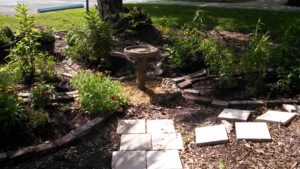Tzedek, tzedek tirdof: Justice and righteous shall you pursue!
Tzedek, Tzedek Tirdof: Justice and Righteousness shall you pursue. (Deuteronomy 16:18)
Jewish sages caution us to pay attention to the repetition of a word in Torah. In our gardens we aspire to bring Tzedek – justice and righteousness – from two directions: receiving and giving. With humility and appreciation for what we harvest, we can share some of our bounty. We can also look out and see that there are people in need of sustenance in our own community. With an effort from our garden, we can help feed the hungry.
In the book of Leviticus, at the heart of the Torah, God offers a list of the ways that we can connect and emulate the holiness of the Divine. This portion, called Kedoshim, emphasizes holy relationships and holy time. It also acknowledges ways that we can use our fields and gardens to receive and generate holiness. Leviticus 19:9 When you reap the harvest of your land, you shall not reap all the way to the edges of your field, or gather the gleanings of your harvest. 10 You shall not pick your vineyard bare, or gather the fallen fruit of your vineyard; you shall leave them for the poor and the stranger: I the Lord am your God.
Even as we partake in the produce of our fields, we realize that our bounty might solely belong to us. Without God’s support and without good growing conditions – soil, sun, rain, lack of pests and disease – we would not have food to eat. Like pinching off a corner of Challah to show appreciation for God’s blessings, we share a portion of the food we grow in acknowledgment that we need help to be successful in our garden.
Deuteronomy 15:7 If, however, there is a needy person among you, one of your kinsmen in any of your settlements in the land that the Lord your God is giving you, do not harden your heart and shut your hand against your needy kinsman. 8 Rather, you must open your hand and lend him sufficient for whatever he needs. We also have a responsibility to give to those in need. It is an obligation to ensure that the people who live around us have basic needs (i.e. food, water, and shelter). With the words of Pirke Avot in mind, “You don’t have to complete the task, but you don’t avoid working on it” giving produce from a community, congregational or home garden (even just a handful of tomatoes) to a food pantry or an organization that helps feed the hungry lives out this Jewish value and makes an impact.


Donate
Directions